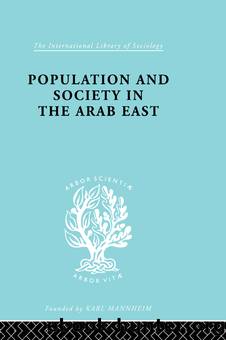Populatn Soc Arab East Ils 68 by Gabriel Baer

Author:Gabriel Baer [Baer, Gabriel]
Language: eng
Format: epub
ISBN: 9780415863315
Barnesnoble:
Publisher: Taylor & Francis
Published: 2013-05-08T00:00:00+00:00
B. THE FELLAH
1. LAND AND LAND TENURE
In most of the Arab countries of the Middle East some two-thirds of the population is rural.
Land is the main factor which determines the material and social life of the fellah. An outstanding feature of much of the Arab Middle East, however, is the fellahâs detachment from the land, mainly because he is not its owner and also because of nomadic influences. This is particularly true of the plains of the Fertile Crescent, where the fellah is reputed for his contempt for land and agricultural work. It is also the main region of tenancy.
It was this region that Weulersse had in mind when he wrote:
Paradoxical, in our Western eyes even shocking, is the existence of a peasant population in the East which lacks all peasant atavism; here are people of the land who have no feeling for the land or respect for it, farmers who despise farming, tillers of the land who loathe the plough, villagers who disavow their village in order to remain faithful to their tribe. The peasant masses of the Middle East exist in a state of self-rejection. This is quite unique, an almost pathological situation among farmers in the whole world.2
In contrast, wherever the land is the property of small landowners and nomadic influences are not great, the fellahâs attachment to his land is greater. This is the case, for instance, in the orchard and garden area around Damascus, in the Lebanon, and in some other hilly regions of the Fertile Crescent.
According to Tannous, a deep attachment to the land is felt by the small-scale Lebanese farmer who has been a landowner for many generations.1 In the hills of Lebanon land is a dearly loved family possession which is sold only under dire necessity and then, when possible, only to members of the family. Most authors describing Egyptian villages stress the strong ties of the fellah to his land and village, and Ayrout even claims that for an Egyptian fellah âto desert the village means deathâ.2
At all events, land is of utmost importance in fashioning rural society, since land tenure is the basis of economic and social life of the villagers.
Until the start of the nineteenth century in Egypt, and until the middle of that century in the other Arab countries, land tenure took a form generally known as Iltizam, whereby tax-farming rights were granted to Mamluk soldiers, heads of prominent families, Beduin shaikhs, religious dignitaries, and so on. In return for a fixed payment to the State, each tax-farmer received a village or villages, the income from which was his for the extortion, as well as a private lot of land.
It would not be correct to call this system âfeudalismâ. Except in the tribal regions, the tax-farmers were city dwellers, who were replaced from time to time and had no attachments to their estates. Their function was not to raise an army for the central authorities but only to pay over the taxes. There were, then, none of the formal ties of loyalty between tax-farmer and ruler.
Download
This site does not store any files on its server. We only index and link to content provided by other sites. Please contact the content providers to delete copyright contents if any and email us, we'll remove relevant links or contents immediately.
Collaborating with Parents for Early School Success : The Achieving-Behaving-Caring Program by Stephanie H. McConaughy; Pam Kay; Julie A. Welkowitz; Kim Hewitt; Martha D. Fitzgerald(898)
Entrepreneurship Education and Training: The Issue of Effectiveness by Colette Henry Frances Hill Claire Leitch(665)
Adding Value to Policy Analysis and Advice by Claudia Scott; Karen Baehler(499)
Materializing the Middle Passage by Jane Webster;(496)
Race and American Political Development by unknow(488)
Sociological Perspectives of Health and Illness by Constantinos N. Phellas(478)
American Government and Politics Today by Steffen W. Schmidt Mack C. Shelley Barbara A. Bardes(475)
Human and Global Security : An Exploration of Terms by Peter Stoett(461)
Control Of Oil - Hardback by Kayal(460)
The Disappearance of Rituals: A Topology of the Present by Byung-Chul Han(399)
Advances in Child Development and Behavior, Volume 37 by Patricia J. Bauer(396)
The Catholic Church and European State Formation, AD 1000-1500 by Jørgen Møller(388)
The World According to China by Elizabeth C. Economy(379)
Theories of Counseling and Psychotherapy: A Case Approach by Nancy L. Murdock(370)
Left Is Not Woke by Susan Neiman(367)
Application of classical statistics, logratio transformation and multifractal approaches to delineate geochemical anomalies in the Zarshuran gold district, NW Iran by unknow(362)
Turkey's Relations with the West and the Turkic Republics: The Rise and Fall of the Turkish Model by Idris Bal(353)
Cross-Cultural Child Development for Social Workers by Lena Robinson(348)
Japan's Ainu Minority in Tokyo by Mark K. Watson(331)
